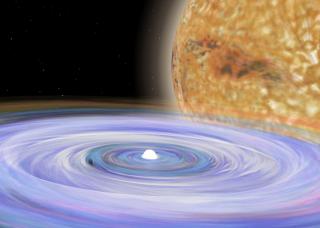Bibcode
Rodríguez-Gil, P.; Martínez-Pais, I. G.; de la Cruz Rodríguez, J.
Referencia bibliográfica
Monthly Notices of the Royal Astronomical Society, Volume 395, Issue 2, pp. 973-978.
Fecha de publicación:
5
2009
Número de citas
16
Número de citas referidas
15
Descripción
We present time-resolved spectroscopy and circular spectropolarimetry of
the SW Sex star RXJ1643.7+3402. We find significant polarization levels
exhibiting a variability at a period of 19.38 +/- 0.39 min. In addition,
emission-line flaring is found predominantly at twice the polarimetric
period. These two findings are strong evidences in favour of the
presence of a magnetic white dwarf in the system. We interpret the
measured periodicities in the context of our magnetic accretion model
for SW Sex stars. In contrast with LS Pegasi - the first SW Sex star
discovered to have modulated circular polarization - the polarization in
RXJ1643.7+3402 is suggested to vary at 2(ω - Ω), while the
emission lines flare at (ω - Ω). However, a 2ω/ω
interpretation cannot be ruled out. Together with LS Peg and V795 Her,
RXJ1643.7+3402 is the third SW Sex star known to exhibit modulated
circular polarization.
Proyectos relacionados

Estrellas Binarias
El estudio de las estrellas binarias es una parte esencial de la astrofísica estelar. Una gran parte de las estrellas de nuestra Galaxia y de otras galaxias se ha formado en sistemas binarios o múltiples, por lo que entender la estructura y evolución de estos sistemas es importante desde el punto de vista estelar y galáctico. Un aspecto en el que
Pablo
Rodríguez Gil